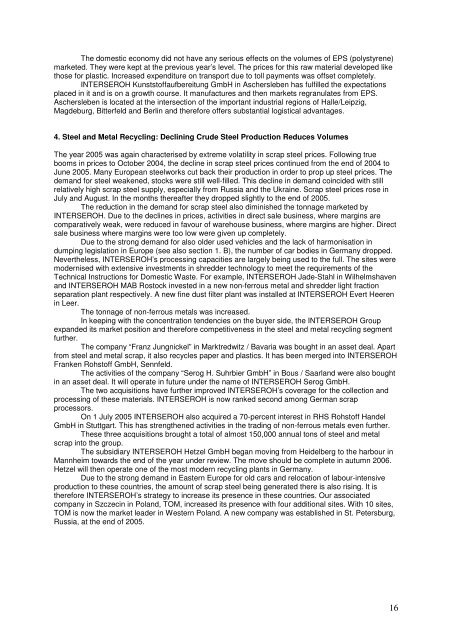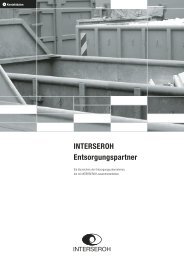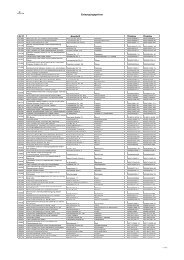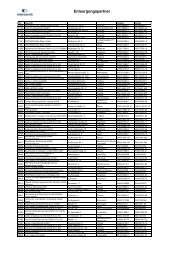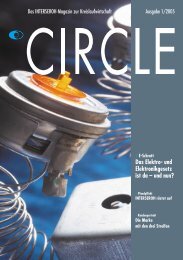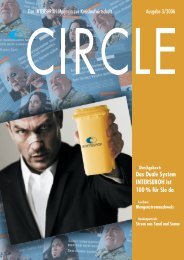Business Report 2005 - Interseroh
Business Report 2005 - Interseroh
Business Report 2005 - Interseroh
You also want an ePaper? Increase the reach of your titles
YUMPU automatically turns print PDFs into web optimized ePapers that Google loves.
The domestic economy did not have any serious effects on the volumes of EPS (polystyrene)<br />
marketed. They were kept at the previous year’s level. The prices for this raw material developed like<br />
those for plastic. Increased expenditure on transport due to toll payments was offset completely.<br />
INTERSEROH Kunststoffaufbereitung GmbH in Aschersleben has fulfilled the expectations<br />
placed in it and is on a growth course. It manufactures and then markets regranulates from EPS.<br />
Aschersleben is located at the intersection of the important industrial regions of Halle/Leipzig,<br />
Magdeburg, Bitterfeld and Berlin and therefore offers substantial logistical advantages.<br />
4. Steel and Metal Recycling: Declining Crude Steel Production Reduces Volumes<br />
The year <strong>2005</strong> was again characterised by extreme volatility in scrap steel prices. Following true<br />
booms in prices to October 2004, the decline in scrap steel prices continued from the end of 2004 to<br />
June <strong>2005</strong>. Many European steelworks cut back their production in order to prop up steel prices. The<br />
demand for steel weakened, stocks were still well-filled. This decline in demand coincided with still<br />
relatively high scrap steel supply, especially from Russia and the Ukraine. Scrap steel prices rose in<br />
July and August. In the months thereafter they dropped slightly to the end of <strong>2005</strong>.<br />
The reduction in the demand for scrap steel also diminished the tonnage marketed by<br />
INTERSEROH. Due to the declines in prices, activities in direct sale business, where margins are<br />
comparatively weak, were reduced in favour of warehouse business, where margins are higher. Direct<br />
sale business where margins were too low were given up completely.<br />
Due to the strong demand for also older used vehicles and the lack of harmonisation in<br />
dumping legislation in Europe (see also section 1. B), the number of car bodies in Germany dropped.<br />
Nevertheless, INTERSEROH’s processing capacities are largely being used to the full. The sites were<br />
modernised with extensive investments in shredder technology to meet the requirements of the<br />
Technical Instructions for Domestic Waste. For example, INTERSEROH Jade-Stahl in Wilhelmshaven<br />
and INTERSEROH MAB Rostock invested in a new non-ferrous metal and shredder light fraction<br />
separation plant respectively. A new fine dust filter plant was installed at INTERSEROH Evert Heeren<br />
in Leer.<br />
The tonnage of non-ferrous metals was increased.<br />
In keeping with the concentration tendencies on the buyer side, the INTERSEROH Group<br />
expanded its market position and therefore competitiveness in the steel and metal recycling segment<br />
further.<br />
The company “Franz Jungnickel” in Marktredwitz / Bavaria was bought in an asset deal. Apart<br />
from steel and metal scrap, it also recycles paper and plastics. It has been merged into INTERSEROH<br />
Franken Rohstoff GmbH, Sennfeld.<br />
The activities of the company “Serog H. Suhrbier GmbH” in Bous / Saarland were also bought<br />
in an asset deal. It will operate in future under the name of INTERSEROH Serog GmbH.<br />
The two acquisitions have further improved INTERSEROH’s coverage for the collection and<br />
processing of these materials. INTERSEROH is now ranked second among German scrap<br />
processors.<br />
On 1 July <strong>2005</strong> INTERSEROH also acquired a 70-percent interest in RHS Rohstoff Handel<br />
GmbH in Stuttgart. This has strengthened activities in the trading of non-ferrous metals even further.<br />
These three acquisitions brought a total of almost 150,000 annual tons of steel and metal<br />
scrap into the group.<br />
The subsidiary INTERSEROH Hetzel GmbH began moving from Heidelberg to the harbour in<br />
Mannheim towards the end of the year under review. The move should be complete in autumn 2006.<br />
Hetzel will then operate one of the most modern recycling plants in Germany.<br />
Due to the strong demand in Eastern Europe for old cars and relocation of labour-intensive<br />
production to these countries, the amount of scrap steel being generated there is also rising. It is<br />
therefore INTERSEROH’s strategy to increase its presence in these countries. Our associated<br />
company in Szczecin in Poland, TOM, increased its presence with four additional sites. With 10 sites,<br />
TOM is now the market leader in Western Poland. A new company was established in St. Petersburg,<br />
Russia, at the end of <strong>2005</strong>.<br />
16


